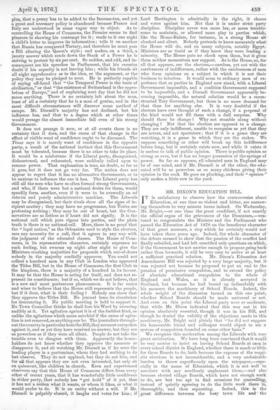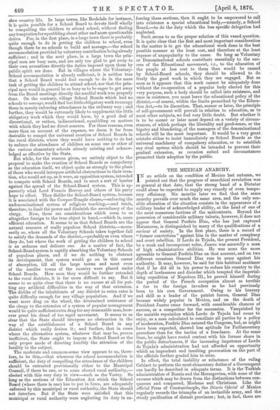MR. DIXON'S EDUCATION BILL.
IT is satisfactory to observe how the controversies about Education, at one time so violent and bitter, are narrow- ing themselves to very minute issues indeed. On Wednesday, Mr. Bright,--at one time the great confidant, if not exactly the official organ of the grievances of the Dissenters,—ven- tured to congratulate the Minister and the Parliament who passed the Education Act of 1870 on the beneficent character of that great measure, a step which he certainly would not have taken three years ago. Indeed, the whole character of the-debate seemed to show that the passion of the conflict had finally subsided, and had left unsettled only questions on which, if the Government be not unwise enough to propose going back rather than forwards, it will be very easy to arrive at at least a sufficient practical solution. Mr. Dixon's Education Act Amendment Bill was rejected by a very large majority, but it was rejected not because he proposed to put an end to the paradox of permissive compulsion, and to extend the policy of absolute educational compulsion to the whole of England and Wales, as it is already accepted in Scotland, but because he had bound up indissolubly with his measure the machinery of School Boards. Indeed, the whole weight of the discussion turned on this one point, whether School Boards should be made universal or not. And even on this point the Liberal party were so moderate, that while Mr. Dixon indicated that this was not in his opinion absolutely essential, though it was in his Bill, and though he denied the validity of the objections made to this machinery, Mr. Bright said plainly that "lie did not suppose his honourable friend and colleague would object to see a system of compulsion founded on some other basis."
We recognise this moderation among the Liberals with very great satisfaction. We have long been convinced that-it would be very unwise to insist on having School Boards at once in every school district in England, whether there is much or little for those Boards to do, both because the expense of the requi- site elections is not inconsiderable, and a very undesirable burden to throw superfluously upon the ratepayer,—espe- cially in the name of Education, which it is not well to associate with any needlessly unpleasant ideas,—and also because elected village Boards, which have not enongh work to do, are but too apt to find occasions for quarrelling, instead of quietly agreeing to do the little work there is, thoroughly, and then separating. Indeed, this is the great difference between the busy town life and the
slow country life. In large towns, like Rochdale for instance, it is quite potsible for a School Board to devote itself wholly to compelling the children to attend school, without finding any temptation for squabbling about other and more questionable duties. For, in the first place, in a large town there is probably quite enough to do in getting the children to school, even though there be no schools to build and manage,—the school accommodation provided by voluntary contribution being already sufficient ; and in the next place, in a large town the prin- cipal men are busy men, and are only too glad to get away to their own avocations directly the duties imposed upon them by public spirit are done. But in villages where the Voluntary- School accommodation is already sufficient, it is neither true that a School Board would find enough to do in the mere task of getting the children to attend school, nor that the prin- cipal men would in general be so busy as to be eager to get away from the Board meetings directly the needful work was properly done. On the contrary, village School Boards which had no schools to manage, would find but little obligatory work to occupy them in merely enforcing attendances in the ordinary way ; and further, they would be extremely likely to supplement the little obligatory work which they would have, by a good deal of discretional, or rather, indiscretional, squabbling on matters with which they had no direct concern. For these reasons, even more than on account of the expense, we deem it far from desirable to compel the universal creation of School Boards in the rural districts, where they would have nothing to do but to enforce the attendance of children on some one or other of the various elementary schools already existing and acknow- ledged as effective by the State.
But while, for the reasons given, we entirely object to the proposal to make the creation of School Boards as compulsory as the education itself, we object quite as strongly to the plans of those who would interpose artificial obstructions to their crea- tion, who would setup, as it were, an opposition system, intended to compete with School Boards, and to erect a sort of barrier against the spread of the School-Board system. This is ap- parently what Lord Francis Hervey and others of his party hope to effect. They dislike the School-Board system, because it is associated with the Cowper-Temple clause,—enforcing the tmdenominational system of religious teaching,—and tends, therefore, to limit the power and diminish the ascendancy of the clergy. Now, these are considerations which seem to us altogether foreign to the true object in hand,—which is, more efficient education. It seems to us that School Boards are the natural resource of really populous School districts,—neces- sarily so, where all the Voluntary Schools taken together fail to satisfy the demands of the district,—probably so even where they do, but where the work of getting the children to school is an arduous and delicate one. As a matter of fact, the School-Board system is rapidly absorbing the Voluntary Schools of populous places, and if we do nothing to obstruct its development, that system would go on in this career of absorption, till all the large towns and most even of the smaller towns of the country were placed under School Boards. How soon they would be further extended to the rural districts, it is far more difficult to say. But it seems to us quite clear that there is no excuse at all for put- ting any artificial difficulties in the way of that extension. The dislike of the inhabitants of any district to extra rates is quite difficulty enough for any village population. And if we want more drag on the wheel, the determined resistance of the clergy to the extension of a system of popular management would be quite sufficientextra drag for any reasonable man, how- ever great his dread of too rapid movement. It seems to us clear that the State should interpose no obstruction in the way of the establishment of a School Board in any district which really desires it ; and further, that in cases where the alternative system, whatever that may be, proves inefficient, the State ought to impose a School Board as the only proper mode of directing forcibly the attention of the locality to the subject. The moderate and common-sense view appears to us, there- fore, to be this,—that wherever the school accommodation is sufficient, the duty of compelling the attendance of the children
should be entrusted provisionally either to the Municipal Council, if there be one, or to some elected rural authority,— sleeted with this very duty in view—such as the Vestry. So
long as the sections of the Education Act which the School Board (where there is one) has to put in force, are adequately
enforced by this municipal or rural authority, the State should not interfere. But if the State were satisfied that this municipal or rural authority were neglecting its duty in en- forcing these sections, then it ought to be empowered to call into existence a special educational body,—namely, a School Board,—to do the duty which the less specific delegation had neglected.
Such seems to us the proper solution of this vexed question. It is quite clear that the first and most important consideration in the matter is to get the educational work done in the best possible manner at the least cost, and therefore at the least expense of unpopularity to the cause. So long as Voluntary or Denominational schools contribute essentially to the suc- cess of the Educational movement, i.e., to the education of the people at less cost to them than would be caused by School-Board schools, they should be allowed to do freely the good work in which they are engaged. But so soon as it appears that this work cannot be adequately done without the co-operation of a popular body elected for this very purpose, such a body should be called into existence, and once in existence, you must leave the educational policy of the district,—of course, within the limits prescribed by the Educa- tion Act,—to its discretion. That, sooner or later, the principle of self-government will prevail in relation to education, as to most other subjects, we feel very little doubt. But whether it is to be sooner or later must depend on a variety of circum- stances, of which perhaps the liberality and good-sense, or the bigotry and blundering, of the managers of the denominational schools will be the most important. It would be a very great mistake either to insist immediately on School Boards as the universal machinery of compulsory education, or to establish any rival system which should be intended to prevent their gradual extension, as occasion suited and circumstances promoted their adoption by the public.



































 Previous page
Previous page